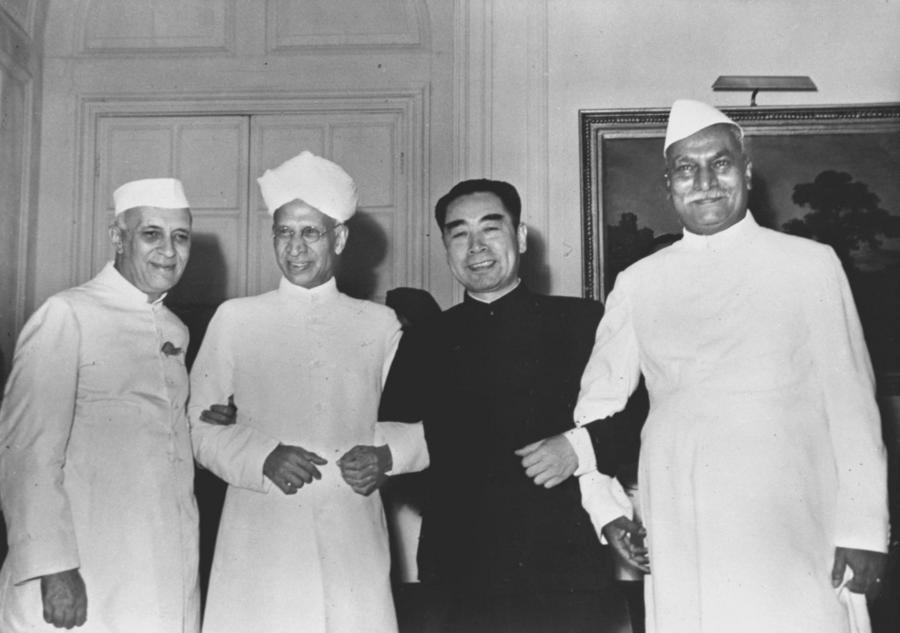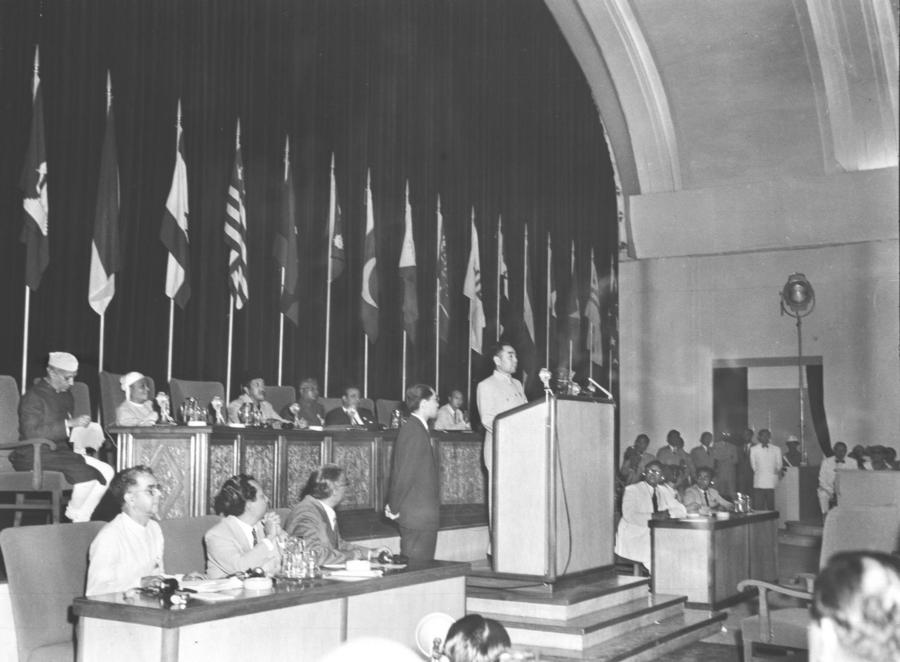World Insights: Five Principles of Peaceful Coexistence -- timeless guide for int'l relations

A group photo of Chinese Premier Zhou Enlai, Indian President Rajendra Prasad (first from right), Indian Vice President Sarvapalli Radhakrishnan (second from right) and Indian Prime Minister Jawaharlal Nehru taken in the last ten-day period of June 1954 on the occasion of Premier Zhou's visit to India. The joint communique signed by the two sides on June 28 initiated the Five Principles of Peaceful Coexistence. Xinhua photo (June 18, 1994)
Given the current complex international security situation, observers deem the Five Principles of Peaceful Coexistence to remain the key to safeguarding world peace and stability.
JAKARTA, June 28 (Xinhua) -- Seventy years ago, an idea featuring mutual respect and peaceful coexistence among nations, the Five Principles of Peaceful Coexistence, was put forward by China, and has since guided its relations with neighboring countries and served as the basis for China's participation in international affairs.
Experts say the five principles, namely mutual respect for territorial integrity and sovereignty, non-aggression, non-interference in each other's internal affairs, equality and mutual benefit, and peaceful co-existence, have been widely recognized by the international community over the decades and become a basic principle in international relations and a basic guideline for international law.
Looking ahead, as the world is facing grim new challenges toward peace and development, it is even more relevant to promote the five principles, they say.

Photo shows Zhou Enlai heads a delegation to attend the first Asia Africa conference in Bandung in Indonesia in April 1955. Xinhua (Feb.11, 1998)
NEW PARADIGM
After World War II, many Asian and African countries gained independence from colonial rule. These newly independent nations aspired to build an international relationship based on equality.
It was in this context then Chinese Premier Zhou Enlai first proposed the Five Principles of Peaceful Coexistence in 1953 during negotiations with the Indian government over border issues regarding Xizang.
In June 1954, Zhou visited India and Myanmar, and issued joint statements with leaders of the two countries respectively, affirming the five principles as the cornerstone for guiding relations between China and the two countries.
The five principles, which stress peaceful means to resolve disputes, gradually gained traction beyond Asia. The Asian-African Conference held in Bandung, Indonesia in 1955 further solidified their importance, leading to the emergence of the Non-Aligned Movement.
Samuel S. Kim, a senior research scholar at Columbia University, said the Five Principles of Peaceful Coexistence and the Bandung Spirit not only helped newly independent countries establish a new model of international relations but also provided valuable guidance for finding independent development paths in the era of globalization.
Former Indonesian Foreign Affairs Minister Marty Natalegawa said the five principles reflect the common ideas and goals of nations in the region. "Thus, they were formally established as common principles guiding state relations during the Asian-African Conference," he said.
BALLAST FOR WORLD PEACE
Given the current complex international security situation, observers deem the Five Principles of Peaceful Coexistence to remain the key to safeguarding world peace and stability, as it provides a clear and enduring framework for handling international relations.
"Peace and stability are prerequisites for sustainable development and prosperity in our region," said Kao Kim Hourn, secretary-general of the Association of Southeast Asian Nations (ASEAN). "As we strategically navigate a complex geopolitical landscape, it is essential to uphold the principles of mutual respect, non-interference, peaceful resolution of disputes, as well as to continue enhancing mutual trust and understanding through dialogue and diplomacy, cooperation and collaboration, consultation and engagement."
Tri Basuki Joewono, president of the Catholic University of Bandung, Indonesia, emphasized that the Five Principles of Peaceful Coexistence embody Chinese wisdom on handling relations between countries.
"Like the Bandung Spirit, it is a significant and lasting policy declaration that teaches human society how countries should coexist harmoniously with equality and mutual respect. As long as human society exists, it will never be outdated," he added.

Passengers view a model of a high-speed electrical multiple unit (EMU) train of the Jakarta-Bandung high-speed railway at the waiting hall of Halim Station in Jakarta, Indonesia, June 17, 2024. (Xinhua/Xu Qin)
NEW CONTRIBUTION
Despite ongoing conflicts and turmoil in some parts of the world, the universal desire for peace and development persists. While consistently adhering to developing friendly cooperation with all countries based on the Five Principles of Peaceful Coexistence, China has creatively put forth new ideas and provide new approaches to security challenges.
Former Ecuadorian President Guillermo Lasso noted that China's Global Development Initiative, Global Security Initiative, and Global Civilization Initiative demonstrated its role as a responsible major country and provided inspiration for countries to engage in dialogue on an equal footing and achieve peace and development.
Sykhoun Bounvilay, a retired senior diplomat of Laos, said China's global initiatives and the vision of a community with a shared future for mankind embody the essence of the Five Principles of Peaceful Coexistence, and demonstrate consistent efforts to contribute China's wisdom and Chinese solutions to addressing current international disputes.
Oh Ei Sun, principal advisor for Malaysia's Pacific Research Center, said the Global Security Initiative proposed by China was an epoch-making and forward-looking framework. "China has acted as a peace broker in the restoration of diplomatic ties between Saudi Arabia and Iran, which is an important achievement under China's Global Security Initiative," the expert said.
Photos
Related Stories
- Xi holds talks with Peruvian president
- Full Text: Address by Chinese President Xi Jinping at conference marking 70th anniversary of Five Principles of Peaceful Coexistence
- Xi, Venezuela's Maduro exchange congratulations on 50th anniversary of ties
- Xi stresses improving systems for exercising full, rigorous Party governance
- Xi addresses conference marking 70th anniversary of Five Principles of Peaceful Coexistence
Copyright © 2024 People's Daily Online. All Rights Reserved.









